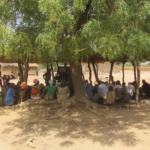


University of Vermont and State Agricultural College
Universidad Mayor Real y Pontificia de San francisco Xavier de Chiquisaca (USFX), Fundacion Valles, Lista Productores Ecologicos (LPE)
Bolivia
11/2015—11/2019
One of the main weaknesses that has been identified in the Andes Theory of Change is the projects’ ability to link local impacts with global knowledge. This is especially true of NGO-led projects like Organic Groundnut III, where the lead organization is mainly focused on development impacts and has less familiarity with creating public goods. A PhD studentship is a way of having someone embedded in an endogenous process for a long period of time who is also in dialogue with global literature and is often part of the larger research agenda of their home university. The ARGL has ample experience working with farmers groups and NGOs in Latin America and has developed tools and approaches to support action-research and ensure benefits for all the stakeholders involved. For example, they ask for collaborators to sign a contract so the farmers’, NGO’s, student’s and ARGL’s expectations are negotiated and agreed upon at the beginning of a project. ARGL’s expertise in PAR will help FV implement their participatory approach that often in practice takes on the characteristics of technology transfer. Moreover, ARGL’s deep experience in agroecology will complement FV’s work with groundnut producers who are certified organic. Many of FV’s current staff do not have training in organic or agroecological principles and would benefit from access to experts and materials. The explicit emphasis on learning and transformative capacity building at all levels is an important and distinctive element of the proposal. We know that FRNs will require distinct abilities that most farmers and extension workers do not yet have. Recent work using a Community Capitals Framework suggest that increasing human or intellectual capital can in turn be leveraged to invest in social, natural and other capitals, creating an upward spiral of sustainable development. This project would provide a solid team that could support and learn from the FRN experience to ultimately provide new and successful models for expanding systems impacts.The Agroecology and Rural Livelihoods Group (ARLG) at the University of Vermont is implementing a Participatory Action Research (PAR) process that supports the development of the Valles Farmer Research Network (V-FRN). The V-FRN focuses on the production, processing and commercialization of groundnuts within the context of the larger maize-groundnut-hot pepper production system, in conjunction with the Bolivian NGO and current CCRP grantee, Fundacion Valles (FV). This PAR process includes not only the identification and pursuit of appropriate FRN research topics, but also works to realize the full potential of the network through monitoring activities that provide real-time reflection, as well as supporting a developmental evaluation that contributes to a larger evidence base on FRNs. The PAR process will result in an exchange of expertise among all parties, resulting in strong, relevant and replicable products. Potential research topics for the V-FRN include aflatoxin control, new techniques and technologies for research dissemination (use of tablets/smart phones) and alternative technologies for peanut dryers. In terms of the development evaluation of the FRN process, possible research inquiries could include theories of empowerment and engagement that increase the participation of women and intergenerational collaboration, the applicability of farmer field school techniques, and the development of farmer typologies to identify factors that encourage/limit the uptake of recommended management practices.
Fundacion Valles leadership and FRN members trained on principles, tools and methods for Agroecology and Participatory Action Research, including mixed methods and writing for various audiences.The key goals and priorities of the Valles FRN determined through a participatory process.Valles FRN collects, analyzes and uses data in a participatory process.FRN process is monitored and evaluated as part of a participatory local process and also as part of the CCRP working group.FRN case studies that are part of PhD thesis, journal articles, conference proceedings, policy briefs and shared with farmer organizations (co-authored by all participants).
